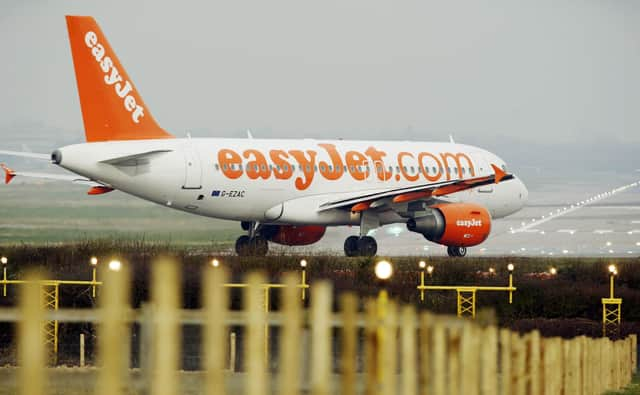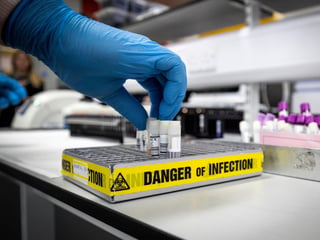Coronavirus in Scotland: Easyjet cancels all flights from UK to Spain


Spanish authorities have brought in strict travel restrictions for flights to, from and within Spain from Monday (tomorrow).
The airline said it will operate their normal schedule today (Sunday) and Monday 16 March to try and allow as many people as possible to return home.
Advertisement
Hide AdAdvertisement
Hide AdHowever, all flights from March 17 will be cancelled with the flight ban due to continue until at least March 29.
Only a number of rescue flights will operate, the airline said.
Passengers who have their flights cancelled will receive an email and SMS from easyJet with details of how to book onto the rescue flights.
The announcement from easyJet, the biggest airline operating out of Scotland, comes after a similar move by Jet2.
A statement from the airline said: “For customers who have their flight cancelled, we are committed to getting you home.
“To try and make sure everyone who needs to travel is able to, easyJet are putting on a number of rescue flights over the coming days.”
Passengers will able to book onto a rescue flight online or by turning up to their departure airport as early as possible on the day they want to fly home.
The airline said passengers will get on a rescue flight “if there are seats available”.
Advertisement
Hide AdAdvertisement
Hide AdThe statement said: “We’ll be accepting bookings on a first-come, first-served basis so if you do wish to fly, please book yourself on as soon as you can.
“Once you are confirmed on a flight, we do ask that you please show up for that flight – this will help us get people home as quickly as we can.”
he UK's fight against coronavirus is set to dramatically escalate, with measures to shield the elderly from the disease and plans to isolate entire households.Boris Johnson will also personally urge manufacturers to shift their production lines to build ventilators as the NHS prepares for a significant increase in cases of Covid-19.And the Government is in talks with private hospitals about the possibility of taking over beds in a further sign of the pressures that will face the health service at the peak of the coronavirus outbreak.In an acknowledgement of the almost wartime measures being introduced, Health Secretary Matt Hancock said: "Our generation has never been tested like this."Our grandparents were, during the Second World War, when our cities were bombed during the Blitz."Despite the pounding every night, the rationing, the loss of life, they pulled together in one gigantic national effort."Today our generation is facing its own test, fighting a very real and new disease."Writing in the Sunday Telegraph, he said everyone would have to make sacrifices to protect not only themselves, but "especially those most vulnerable to the disease".The increase in activity came after 10 more patients died in England after testing positive for Covid-19, while the US government imposed a travel ban on the UK and Ireland in response to the coronavirus pandemic.Experts on the UK's Scientific Advisory Group for Emergencies (Sage) set out the need for extra action to slow the spread of the disease.The panel advised that the next interventions "will need to be instituted soon".Those measures will include steps to shield the vulnerable - including the elderly and those with existing health problems - from the virus by telling them to stay in their houses or care homes.There could also be a shift to household isolation rather than individual self-isolation.The 10 patients who died since Friday were being cared for in Buckinghamshire, Sandwell & West Birmingham, Wolverhampton, Leicester, Barts, London, north Middlesex and Chester, NHS England said.A number of the patients, who were over 60, had underlying health conditions.There have been 1,140 positive tests for coronavirus in the UK as of 9am on Saturday, up from 798 at the same time on Friday.The UK death toll now stands at 21, with 20 in England and one in Scotland.At a press conference on Saturday, President Donald Trump - who said he had been tested for the virus - announced the extension of his travel restrictions to cover the UK and Ireland.The changes will come in at midnight on Monday night in the eastern US.Downing Street said Mr Johnson and the president spoke on Saturday evening and "the Prime Minister set out the science-led approach the UK is taking".On Monday the Prime Minister will urge manufacturers to join a "national effort" to produce equipment for the NHS.Engineers have already been asked to draw up plans to quickly produce more ventilators in the UK amid concerns that critical care facilities will come under intense pressure as the Covid-19 crisis intensifies.Negotiations are also taking place with private health firms about access to their hospital beds.NHS chief executive Sir Simon Stevens said: "We need every part of society and every industry to ask what they can do to help the effort."Whitehall sources have already indicated that mass gatherings could be banned from next weekend.Other measures, including school closures, have also been considered as an option to combat the spread of the virus.Northern Ireland's First Minister Arlene Foster, who has attended the Cobra meetings formulating the UK's response, suggested that schools would need to be closed for four months if that step was taken.
